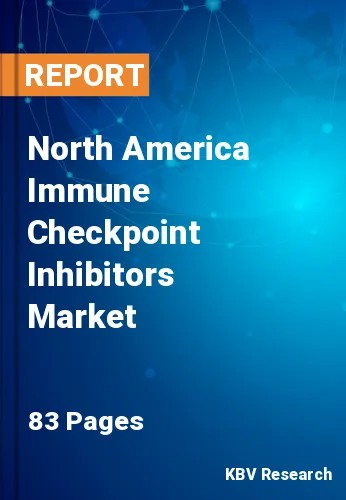The North America Immune Checkpoint Inhibitors Market would witness market growth of 15.6% CAGR during the forecast period (2021-2027).
Immune checkpoints are a necessary aspect of the immune system's operations. Their objective is to keep the immune system from overreacting and destroying viable cells in the body. When proteins over the surface of immune cells, which are also called T cells, recognize and attach to partner proteins on other cells, such as tumor cells, immunological checkpoints get activated. These proteins are known as immune checkpoint proteins. When the checkpoint and companion proteins bind, the T cells receive an "off" signal. This may prevent the tumor from being destroyed by the immune system.
T cells are used by the immune system to fight cancer. These highly specialized cells are exceedingly powerful and can cause harm to healthy cells. Immune checkpoints, which can be positive or negative, regulate T cell activity. Positive immunological checkpoints encourage T cells to keep working, whereas negative immune checkpoints prevent T cells from doing so.
Lung cancer is the second most common cancer in the US, according to the American Cancer Society Inc's estimates for 2020, with 135,720 deaths in both men and women. According to statistics, small cell lung cancer (SCLC) accounts for about 13% of all lung cancers in the United States, while non-small cell lung cancer (NSCLC) accounts for 84 percent. This trend is expected to continue in the future, resulting in increased demand for these products.
Moreover, The CTLA-4-blocking ipilimumab for melanoma was licensed by the US Food and Drug Administration (FDA) in 2011 as the first checkpoint inhibitor immunotherapy for cancer treatment. Since then, the FDA has approved seven checkpoint inhibitors for the treatment of more than a dozen cancers.
The US market dominated the North America Immune Checkpoint Inhibitors Market by Country 2020, and would continue to be a dominant market till 2027; thereby, achieving a market value of $30,476.5 million by 2027. The Canada market is anticipated to grow at a CAGR of 18.2% during (2021 - 2027). Additionally, The Mexico market would witness a CAGR of 17.2% during (2021 - 2027).
Based on Application, the market is segmented into Lung Cancer, Bladder Cancer, Melanoma, Hodgkin lymphoma, and others. Based on Type, the market is segmented into PD-1 Inhibitor, PD-L1 Inhibitor, and CTLA-4 Inhibitor. Based on countries, the market is segmented into U.S., Mexico, Canada, and Rest of North America.
Free Valuable Insights: The Global Immune Checkpoint Inhibitors Market is Estimated to reach $75.9 Billion by 2027, at a CAGR of 16.1%
The market research report covers the analysis of key stake holders of the market. Key companies profiled in the report include AstraZeneca PLC, Beigene Ltd., Shanghai Junshi Biosciences Co., Ltd., Bristol Myers Squibb Company, GlaxoSmithKline PLC, Eli Lilly and Company, Merck Group (Merck Sharp & Dohme Corp.), Sanofi S.A., Merck & Co., Inc., and F. Hoffmann-La Roche Ltd.
By Application
By Type
By Country
Our team of dedicated experts can provide you with attractive expansion opportunities for your business.

